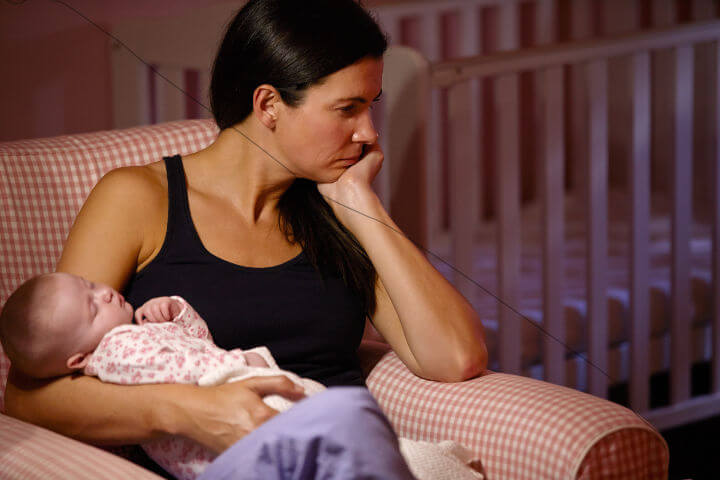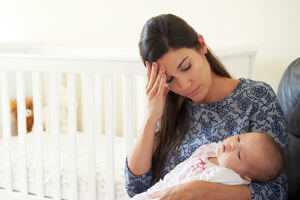
Just this week Facebook unveiled its latest social tool: an arsenal of conversation reactions. For years, social media users have campaigned for a “dislike” feature as a complementary reaction alternative to the “like” button. But rather than simply install “dislike” with a “thumbs down” image, Facebook has provided additions to the long-standing “like” button to include: “love,” “haha,” “yay,” “wow,” “sad,” and “angry,” each with an accompanying emoji.
Many Facebook users are not amused. The masses have responded saying that they simply wanted an additional “dislike” option. Others have noticed that the menu of emotional responses simply isn’t broad enough for the complexity of human feelings. Such is the case with postpartum depression. If a new mom reports feeling the “baby blues,” should she label it “wow?” As in, she’s surprised it happened? “Sad?” Except “sad” probably doesn’t cover the full range of feelings involved in postpartum depression. “Angry?” Not really. A sardonic “yay?” Except the accompanying emoji doesn’t appear to smirk accordingly.
It seems like in the case of a complex emotional situation, a social media update on the part of a new mom describing as much or as little as she wants to share would be more helpful. Friends and other connections could use her description as an opportunity to simply press a “dislike” button – and offer follow-up questions and responses.
Negative Emotions During the Postpartum Experience
“Angry” and “sad” may very well be part of a new mom’s postpartum experience. At the conclusion of many months of pregnancy, a new mom’s body surges with hormones that promote milk production and bonding with her baby, processes the new challenges and joys of motherhood, and manages the strain put on her body during labor and delivery. In the midst of all that, all new mothers naturally experience bursts of ups and downs.
However, sometimes the dramatic ups and downs continue past the first week or two after birth. Sometimes the “downs” go well beyond what Facebook might describe as “”sad” or “angry,” or even “wow.” That’s when new moms might be suffering from postpartum depression (PPD)
Signs & Symptoms of PPD
 Feelings and other physical symptoms of PPD might include insomnia, frequent crying spells, profound irritability,
Feelings and other physical symptoms of PPD might include insomnia, frequent crying spells, profound irritability,
exhaustion, anxiety, and feelings of overwhelming guilt at what feels like it should otherwise be a positive, joy-filled season of life. Some feel stress greater than “being a new mom is hard!” and more like “I’ll never be able to be a good mom – I shouldn’t have had a baby.” American culture also primes new moms to feel they should be immediately confident, competent, and in fact, perfect in everything they do and feel from the moment the baby emerges. Yet, PPD causes new moms to feel like their baby would be better off without them and the messy feelings they have.
Some new moms don’t feel an immediate “like” or “yay” – in other words, a dramatic feeling of bondedness – to their baby, causing dramatically negative fears and self-loathing. PPD is a complex web of fear, anxiety, confusion, and negativity, all related to the arrival of baby. Yet, it is not a personal failing. Instead, PPD is a serious, medical condition.
New moms suffering from symptoms of postpartum depression benefit from diagnosis, ongoing medical care, and support from her team of family, friends, and other professionals during her ongoing transition into motherhood. Without a web of support, postpartum depression will not only rob or reduce a new mom’s positive experiences of her baby, but it might also affect her baby’s care and development.
Staggering Statistics
The Centers for Disease Control have reported that 11-20 percent of women who give birth annually suffer from symptoms of PPD. In other words, with about 4 million births annually, around 600,000 of all new mothers have diagnosable postpartum depression in the United States.
The American Psychological Association independently reports figures at about 1 in 7, or about 14 percent. In short, it is likely that you or someone you know has or will suffer from postpartum depression. It is a relatively common experience among mothers – a statistic that may help new moms feel encouraged that they are not alone in the midst of their illness. PPD does not discriminate by age, socioeconomic status, race or ethnicity, marital status, or number of children.
PPD can occur days or even months are the arrival of baby and will have lasting effects if left untreated. Symptoms may leave women unable to care for themselves, which limits the care they can provide for their baby.
There is Hope!
Even when suffering from difficult PPD symptoms, there’s hope (this might be just the right place for a Facebook “yay”!). New moms should contact their obstetrician or primary care physician for a consultation. Even if an obstetrician or primary care doctor isn’t able to directly treat a mother’s PPD, they will have contacts for those who can. Treatment may include regular visits with a counselor or therapist (a social worker, psychologist, or psychiatrist) and/or antidepressant medication.
If a new mom is nursing, note that medications are available that are safe for use in conjunction with breastfeeding. Furthermore, many communities also offer support groups for the many women who struggle with PPD and may want to share their experiences with one another for mutual care and support.
New mothers suffering from PPD may also benefit from professional assistance. In-home care providers are available for hire to assist in the baby’s daily care needs and/or mom’s needs. In-home help might assist with the physical needs of the new baby or even simply serve by helping with household maintenance such as washing dishes, laundry support, and preparing meals.
Contact Caring Hands Matter for Support
By simply having an extra set of trained, supportive hands, women suffering from PPD may be able to feel more confident about their skills in caring for their child and have needed support with the gaps PPD causes in daily routines. Women with PPD need to remember that PPD is an illness, not a deficit. Women with PPD are not alone. For more information about postpartum depression and home care in Fairfax, VA, please call or contact Caring Hands Matter online.